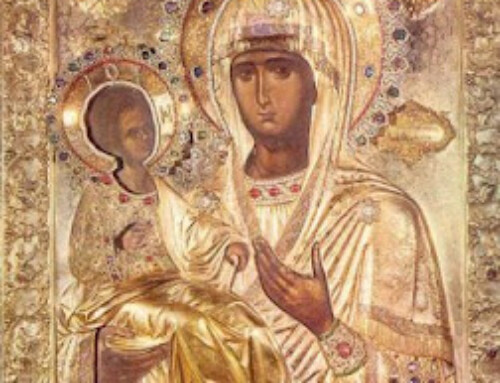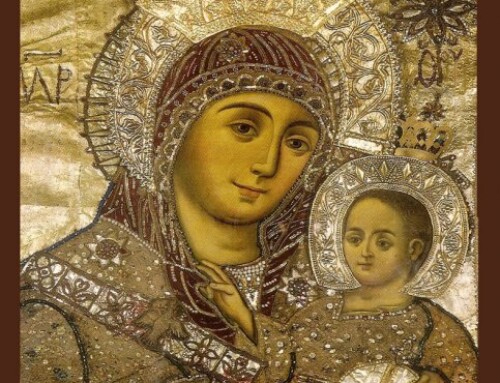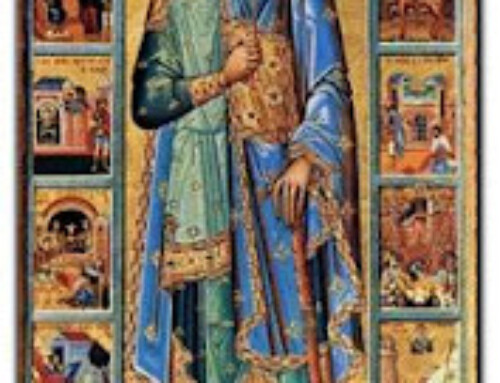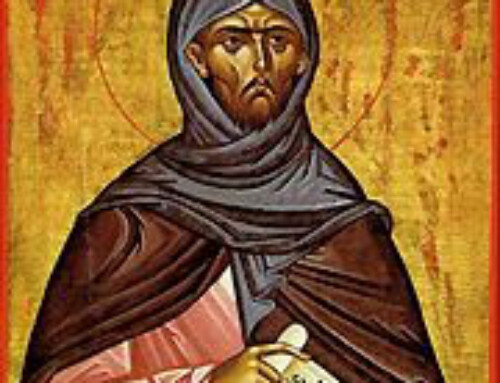Again Magazine June 1994 Page 28/30
MOSES THE BLACK
From Sinner To Ascetic
A.D. 330 to 405
One of the most remarkable stories recorded about the Fathers of the Desert is that of Saint Moses. Moses was by race an Ethiopian and his skin was black. He was the slave of an Egyptian official in high authority. Because of the general immorality and evil deeds of his life, especially his thievery, Moses was driven out of his master’s house. It is said that Moses even
went so far as to commit murder, which explains his final martyrdom. Most slaves in those days would have been killed for disobedience or trouble to their masters; but God had other plans for Moses.
Bishop Palladius of Helenopolis, who was alive at the time of Saint Moses, wrote of his life. As was done in the stories about King David of old, Palladius recorded some of the wicked acts of Saint Moses in order to show forth the beautiful and holy fruit of his repentance.
Moses was a man of huge stature and was famous for his gang of seventy-five thieves. Because of his great physical strength and courage, the robbers chose Moses to be their leader. This gang of thieves became a social menace and a living terror to the community they lived in.
There is one well-known story in particular that demonstrates the wild recklessness and incredible human strength Moses displayed in his youth. He terrorized his victims, especially a particular man who was a shepherd by trade. Somehow, the shepherd’s dog spoiled a certain evil scheme of Moses and his gang by its continual barking. Moses was extremely angry at this interference and sought revenge against the dog’s master. Moses set out to steal the man’s sheep and do violence against the shepherd himself.
To get to the shepherd, Moses had to cross the longest river in the world, the crocodile-infested Nile, which ran through his homeland of Ethiopia all the way through Egypt to the Mediterranean Sea. Someone who knew of the problem between Moses and the shepherd saw Moses swimming across the river with a sword in his teeth and his clothes piled on top of his head. This man ran and told the shepherd, who wasted no time digging a hole in the side of the riverbank, where he covered himself with sand to hide from his stalker.
Moses arrived and found the shepherd’s flock but could not find the shepherd. Finally, in a fit of anger, he chose four of the best rams (males) from the man’s sheep and killed them. Then he tied them together with a rope and towed the four rams back across the Nile, along with his sword and clothes. Arriving at a small village on the opposite shore, Moses skinned and flayed the four rams, selecting the choice portions of meat for himself. He sold the remaining meat and skins for money to buy wine. Having drunk the wine, Moses proceeded to walk fifty miles to return to his companions. One writer comments, “That was the sort of man Moses was.”
However, the story of his life continues. One morning while Moses was involved in doing something evil, something happened which caused him to come to his senses. Something, we don’t know what, caused Moses to repent of his evil deeds. Some believe this happened while Moses was hiding out in a monastery. Others, such as Bishop Palladius, say Moses fled to the monastery because he had already repented.
Whatever happened, Moses from that time on was found fervently embracing the work of repentance at the monastery of Petra in the desert at Scete. His efforts in the ascetic struggle were so severe that the devil himself, who had controlled Moses in his youth, would stand before him in visible form and look upon him.
Once four thieves came to Moses’ cell to rob him, not knowing who he was. At that time Moses had been fasting for seven days and had eaten nothing. Nevertheless, he overpowered the thieves, tied them together with ropes, and slung them across his back like a bag of chopped straw. He then brought them to the church and dumped them on the floor of the sanctuary, saying to the astonished monks present. “Since I can no longer do any harm to any man, what do you command me to do with these who came to slay me?”
Then he turned to his attackers, saying. “I indeed am Moses who was formerly the leader of the gang of thieves.” Startled, realizing who this man was, the robbers began to praise and glorify God; and when they saw the sincerity of his repentance, they too committed themselves with an oath to cast off their evil way of life, saying, “Let us also embrace the life of repentance, so that we may become worthy of the forgiveness of sins, even as he also is worthy.”
The truth is that Moses did not believe that he himself was worthy. He did not become well-behaved in a day. While he was fasting and during the time of prayer and silent contemplation, the devil would bring back to Moses the memories of his past life and sinful habits, and would tempt him severely to fall away from his covenant with the Lord. In fact, Moses fell into dark despair over the seeming impossibility of overcoming his violent passions.
Moses went to his old abbot, Saint Isidore the Great, for spiritual direction. He told the abbot about the war he was having with his body. Hearing this, Saint Isidore took Moses up to the roof of a house in the middle of the night to wait for the sun to appear. “See!” he said, “the light only gradually drives away the darkness. So it is with the soul.”
The wise old abbot would say to Moses, “Don’t get too distressed, for these temptations are the beginning of the birth pangs, and they come upon you seeking to receive something from you, even as a dog comes continually to the cook: but if a man doesn’t give him anything, the dog will not go there again. And so it is also with you, for if you will continue in fasting, and in prayer, and in silent contemplation, the devil will himself fall into despair and will flee from you.”
Moses drew away in solitude to his own cell, where he gave himself completely to the ascetic life. From that time Moses was diligent in his struggle for spiritual growth and perfect subjection of the passions. He ate only ten ounces of dry bread daily when he was working with his hands. In addition, Moses would recite fifty prayers each day in their entirety.
But even with this ascetic effort over the bodily passions, he was still plagued by evil dreams. Moses would cry, “What shall I do? For thoughts of lust arise from my former habits and attack me.” Then Isidore would answer, saying, “These lead you into error because you have not turned away your heart from the image or likeness of them. But give your heart to watching and careful prayer, and you will be free from them.”
Now when Moses had heard this direction, he went to his cell and made a covenant with God that he would neither sleep nor bend his knees during the whole night. Moses lived in his cell for seven years, and remained standing the whole of each night with his eyes open. Besides this, he set for himself other ascetic labors. He would go out at night and visit the cells of old monks, taking their water skins and filling them with water, because their cells were two to five miles from the nearest water.
One night when Moses was bending over a spring to fill water skins, a demon hit him a terrible blow across his legs with a stick, leaving him half dead by the spring. Saint Isidore sent the brethren to carry Moses back to the church of the Scete, where he lay ill for a long time. Moses understood what had happened to him. He never fully recovered from that illness, and never again enjoyed the health of body which he had formerly possessed.
After six years of painful striving. Saint Isidore came to him and said, “Give yourself rest, O Moses, and don’t worry yourself against the devils, and don’t seek to attack them: there is moderation in everything, even in the works of ascetic life.”
Then Moses answered him. “I believe in God, in whom I have placed my hope, that being armed against the devils, I must not cease to wage war with them until they depart from me.”
To this Abba Isidore responded, “In the Name of Jesus Christ, from this time forward the devils will cease from you. Draw near then and participate in the Holy Mysteries, and you shall be free from all impurity, both of the flesh and of the spirit: for you shall not boast within yourself and say. ‘I have overcome the devils,’ for it was for your benefit that they have waxed strong against you.”
So Moses went back again to his cell, and after two months Saint Isidore came to him and asked how he was doing. Moses said to Isidore, “I never see anything now which is hateful to me.”
Moses was held worthy of the gift of divine grace to chase away the devils from many other people. Theophilus, Archbishop of Alexandria, heard of his virtues and ordained him priest in his old age. Moses founded a monastery on his own and had seventy-five disciples. When he was a thief and robber he had seventy-five followers who were just like him—and these same men became his disciples, and were perfected.
Moses foresaw his own death. One day when the brethren were sitting with Abba Moses, he said to them. “Behold, the barbarians are coming today to Scete: you must rise up and flee.” And they said to him. “Will you not flee also, Father?” He said to them, “I have been expecting this day to come for many years, so that the command of our Redeemer may be fulfilled who said. ‘All who take the sword will perish by the sword’ “ (Matthew 26:52). And they said to him. “We will not flee, but will die with you.” He said to them. “This is not my concern, but it is your own desire. Let every man look after himself in the place where he dwells.”
There were seven brothers with him, and after a little while he said to them. “Behold, the barbarians have come near the door.” And the barbarians entered and murdered Moses and six of the brothers. One of the brothers had hidden for fear behind the palm leaves, and he saw seven shining crowns come down and place themselves on the heads of those who had been slain.
Moses was seventy-five years old when he died. He was buried at the Monastery called Dais al Baranius in A.D. 405.
Compiled and paraphrased from:
The Prologue from Ochrid;
Butlers Lives of the Saints. Vol. II;
The Paradise of the Holy Fathers. Vol. 1;
and The writings of Monk Palladius, Bishop of Helenopolis. A.D. 430
Spiritual Counsels Of Saint Moses
Silence gives birth to endeavor, endeavor gives birth to mourning, mourning to fear, fear
to humility, humility to the opening of the eyes, opening of the eyes to love, and love makes the soul sound and passionless and then a man realizes that he is not far from God.
A certain brother went to Abba Moses in Scete, and asked him to speak a word; and the old man said to him, “Go away and sit in your cell, and your cell will teach you everything.”
Abba Moses used to say, “Secret withdrawal from work makes the mind dark, but for a man to endure and to persevere in his works lightens the mind in our Lord, and it strengthens and fortifies the soul.”
A certain brother committed an offense in Scete, the camp of the monks, and when a congregation was assembled on this matter, they sent after Abba Moses, but he refused to come; then they sent the priest of the church to him, saying, “Come, for all the people are expecting you.” And he rose up and came, and he took a basket with a hole in it and filled it with sand, and carried it upon his shoulders, and those who went out to meet him, said to him, “What does this mean, O father?” And he said to them, “The sands are my sins which are running down behind me and I cannot see them, and I, even I, have come this day to judge shortcomings which are not mine.” Ad when they heard this, they set free that brother and said nothing further to him.
Abba Moses said to Abba Poemen, “It is better for a man to put himself to death rather than his neighbor, and he should not condemn him in anything. It is good for a man to die unto every work which is evil, and he should not trouble a man before his departure from the body. If a man does not put himself in the attitude of a sinner, his prayer will not be heard before God.” A brother asked, “What is a sinner’s soul?” And the old man said, “Everyone who bears his own sins, not considering the sins of his neighbor.” The old man also said to him, “If works do not correspond to prayer, he who prays labors in vain.” And a brother asked, “What is the equality of works with prayer?” The old man said to him, “He who prays that he may receive remission of sins must not from that time on be negligent, for if a man gives up his own will, he will be accepted by God rightly.”
And Abba Moses said, “Bear disgrace and affliction in the Name of Jesus with humility and a troubled heart; and show Him your weakness, and He will become to you might.”





